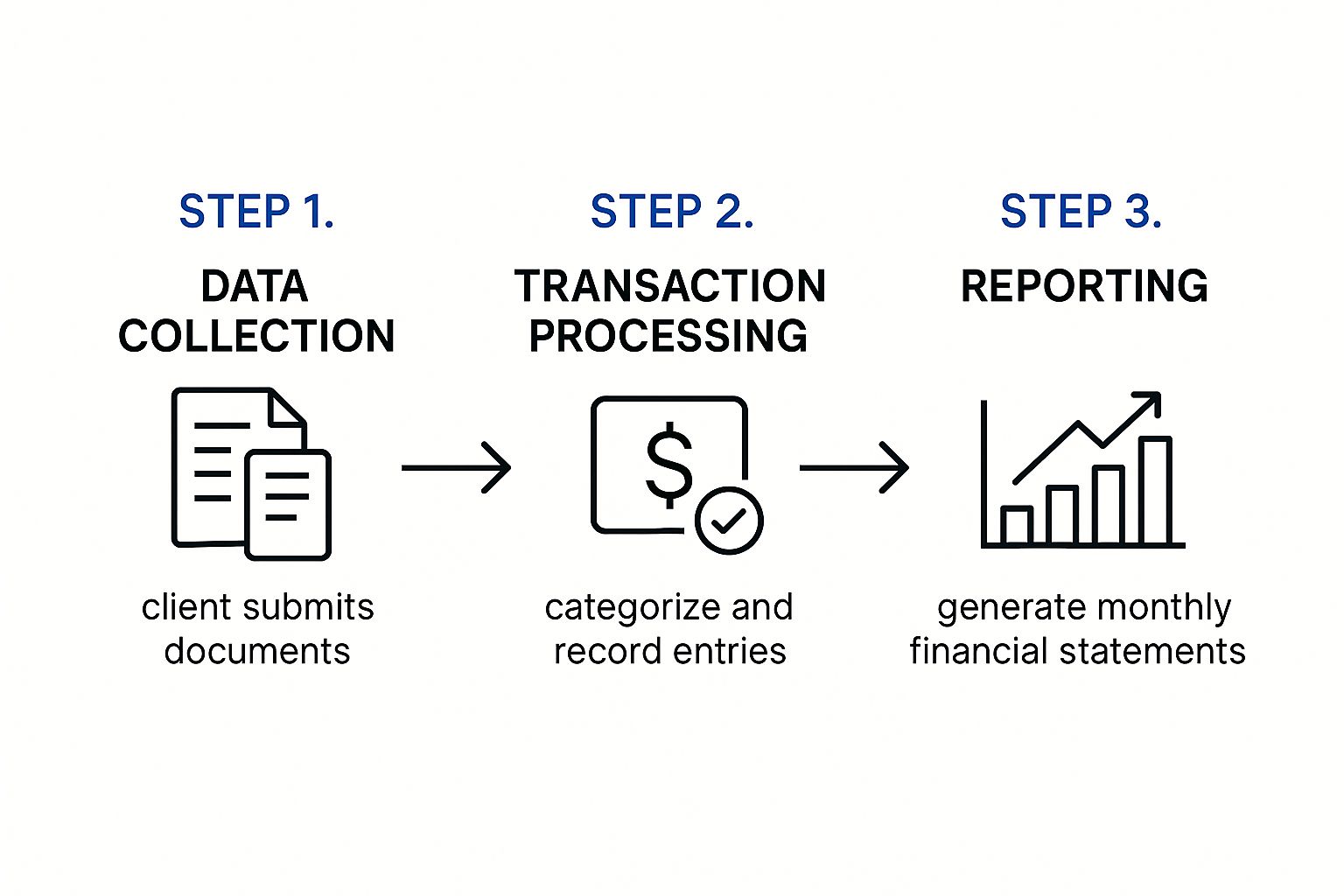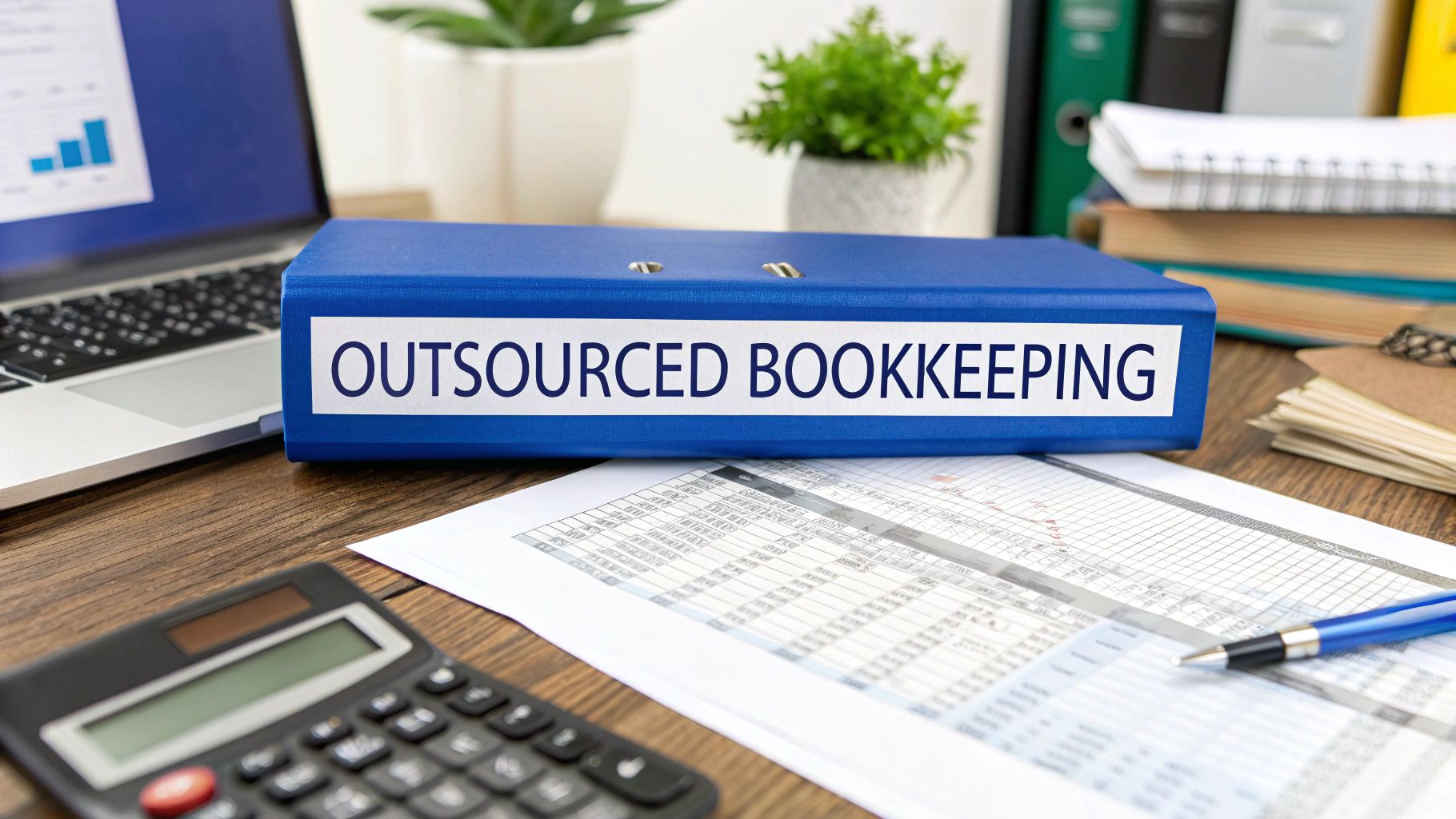Think of your business's finances as its heartbeat. Every beat—every sale, every expense, every invoice—sends vital information through the entire organisation. Outsourced bookkeeping services are like having a dedicated financial specialist on call, making sure that heartbeat is strong, steady, and easy to read. They are the external pros who handle your day-to-day financial records, turning a potential mess of numbers into a clear picture of your company's health.
What Are Outsourced Bookkeeping Services?
In simple terms, outsourced bookkeeping means you hire an outside firm or individual to manage your company's financial record-keeping. Rather than having a bookkeeper on your payroll as a full-time employee, you hand over these crucial tasks to specialists. This gives you top-tier professional expertise without the costs and commitments of hiring someone in-house.
It's like having a financial co-pilot. While you’re focused on the big picture—innovating, talking to customers, and driving growth—your outsourced bookkeeping partner is working diligently behind the scenes. They make sure every pound that comes in and goes out is correctly recorded, categorised, and reconciled.
Core Functions of Outsourced Bookkeeping
An outsourced bookkeeper does much more than just enter data into a spreadsheet. A good provider becomes a key part of your financial engine, handling a whole range of essential duties. This groundwork is what allows for sound, strategic business decisions.
The table below gives a quick overview of the essential tasks you can expect your outsourced bookkeeping partner to handle.
These functions come together to provide a reliable, up-to-date view of your financial standing at any given moment.
A Smart Move for UK Businesses
Bringing in an external bookkeeper isn't just for big corporations anymore. It's fast becoming a go-to strategy for UK businesses that want to be more nimble and efficient. The shift is all about gaining access to specialised skills, saving money, and freeing up precious time to focus on what really matters: growing the business.
By 2025, outsourcing accounting functions, including bookkeeping, has established itself as a common practice among small and medium-sized UK businesses. Recent data shows 24% of UK B2B organisations outsource accounting services, making it one of the most frequently outsourced functions.
This trend shows that more and more business owners realise the immense value external experts can offer. For many UK companies, it's a strategic move that delivers both financial clarity and the freedom to operate more effectively. You can learn more about this trend by looking into recent industry analysis on business process outsourcing.
The True Benefits of Outsourcing Your Bookkeeping

Handing over your books to an outside firm isn't just about ticking another task off your list. It's a strategic decision that can genuinely change the game for your business. For many UK companies, it's the key to unlocking a new level of financial clarity and focus, built on three pillars: serious cost savings, instant access to expert knowledge, and the freedom to get back to growing your business.
Thinking about an in-house bookkeeper's salary is just the tip of the iceberg. The real cost lies beneath the surface, where a raft of hidden expenses can quickly pile up and put a real strain on your budget.
Slash Costs and Boost Your Bottom Line
When you hire a full-time bookkeeper, the expense column extends far beyond their monthly paycheque. This is a classic blind spot for many business owners. In reality, you’re looking at a whole host of related costs that can make a serious dent in your finances over time.
These often-overlooked expenses include:
- Employer's National Insurance Contributions
- Mandatory Pension Contributions
- Recruitment and Training Costs to find and get the right person up to speed
- Software Licences for accounting platforms, which can run into hundreds of pounds a year
- Paid Holiday and Sick Leave, meaning you pay for downtime
Outsourcing flips this script. It turns a large, unpredictable fixed cost into a simple, manageable one. You pay a predictable fee for the exact services you need, giving you the flexibility to scale up or down as your business changes. For anyone serious about how to save money in business, this is a powerful move that directly improves financial health.
This model doesn't just save you money; it provides budget certainty, which is gold dust when you're trying to plan for the future.
Gain Instant Access to Specialist Knowledge
When you partner with an outsourced bookkeeping provider, you aren't just hiring one person. You're tapping into a whole team of financial professionals who live and breathe UK financial regulations every single day.
This means they're always on top of the complex stuff, like the nuances of FRS 102 and FRS 105, shifting VAT requirements, and the latest Making Tax Digital (MTD) mandates from HMRC. An outsourced team also removes the huge risk of having a single point of failure. If your in-house bookkeeper leaves, all that crucial knowledge walks out the door with them, creating a disruptive and expensive gap to fill.
With an outsourced service, you get the benefit of collective wisdom and built-in continuity. This access to a deeper pool of talent is similar to the advantages seen in other areas of business, as we cover in our guide on the benefits of outsourcing recruitment. It keeps your financial operations steady and compliant, no matter what happens.
Reclaim Your Time to Focus on Growth
Perhaps the most valuable benefit of all is the time outsourcing gives back to you. As a business owner, your most important job is to lead, innovate, and steer the company forward. Getting bogged down in spreadsheets and reconciling accounts is a major distraction from these high-impact activities.
By entrusting your financial records to experts, you free yourself up to do what you do best:
- Develop new products or services.
- Nurture relationships with your most important clients.
- Explore new markets and opportunities.
- Lead and motivate your team.
This shift from being an operator to a strategist is what separates a business that’s just treading water from one that's genuinely growing. Handing over the books isn't just offloading work; it's about reclaiming the headspace you need to build a more prosperous future.
How To Choose The Right Outsourcing Partner

Picking an outsourced bookkeeping partner is a huge financial decision for your business. Let's be honest, you're not just hiring another supplier; you're handing over the keys to a critical part of your operations. Get it right, and you'll gain peace of mind and invaluable strategic insights. Get it wrong, and you could be facing a world of compliance headaches and financial chaos.
This decision goes way beyond just comparing quotes. You're looking for a partner who can act as a natural extension of your team, bringing expertise, robust security, and clear communication to the table. It really pays to do your homework and ask some tough questions upfront to set the stage for a great long-term relationship.
Evaluate Their Expertise And Qualifications
First things first: does the provider actually have the right skills for your business? Not all bookkeepers are the same, and their expertise absolutely must match your industry's specific needs and, crucially, UK regulations. A one-size-fits-all service just isn't going to cut it when you're dealing with the finer points of British commerce.
You need to check their credentials and track record. It’s worth reading up on the key qualifications for a bookkeeper so you know what good looks like, but there are a few non-negotiables to look for.
Here are the critical areas you need to dig into:
- UK-Specific Regulations: Do they have deep, proven knowledge of VAT, Making Tax Digital (MTD), and payroll systems like PAYE? For any UK business, this is a deal-breaker.
- Software Proficiency: Are they certified experts in modern cloud accounting platforms like Xero, QuickBooks, or Sage? Their fluency with these tools is fundamental to the entire service.
- Industry Experience: Have they worked with other businesses in your sector? A partner who already gets the unique challenges and revenue streams of your industry will be far more effective from day one.
Scrutinise Their Security And Processes
Handing over your financial data requires an enormous amount of trust. This is why you must rigorously check out a potential partner’s security protocols and internal workflows. Any sign of a casual attitude towards data protection is a massive red flag.
Ask them directly how they plan to handle and protect your sensitive information. You're looking for clear, confident, and specific answers that detail the measures they have in place to prevent data breaches and maintain confidentiality.
A reputable provider must be fully GDPR compliant. They should use secure, encrypted cloud software for all their work and have strict internal policies dictating who can access your data. Never, ever work with a firm that thinks it's okay to share sensitive financial documents over email.
You should also look for a firm with a structured, transparent process. They ought to be able to walk you through exactly how they handle onboarding, data collection, transaction categorisation, reconciliation, and reporting. That kind of clarity shows professionalism and means you won't get any nasty surprises down the road.
Assess Scalability And Communication
Your business isn't going to stand still, so your bookkeeping partner needs to be able to grow with you. A service that fits you perfectly today might be totally inadequate in two years' time. Thinking about scalability is what separates finding a temporary fix from securing a true strategic partner.
When you're interviewing firms, be sure to ask these forward-looking questions:
- How do your services scale? Can they easily handle a higher volume of transactions, add payroll, or manage more complex financial reports as your company expands?
- What does your communication process look like? Sort out how often you’ll get reports and who your main point of contact will be. A steady communication rhythm is key to preventing misunderstandings.
- How do you handle questions? What’s their typical response time for queries? Knowing you can get a timely answer is vital when you need to make fast business decisions.
At the end of the day, finding the right provider of outsourced bookkeeping services comes down to finding a partner who aligns with your business's values, immediate needs, and future goals. If you focus on expertise, security, and scalability, you can build a relationship that will support your growth for years to come.
The Outsourced Bookkeeping Process From Start To Finish
Handing over your books can feel like a big step, but the process is far more straightforward than you might think. It’s not about giving up control; it’s about putting a smarter, more efficient system in place. Let's walk through what actually happens, from your first chat to getting those crucial financial insights each month.
The whole relationship is built on clear communication and secure tech, making sure you're always in the know without getting swamped by the day-to-day grind. Really, it all comes down to delegation. Knowing how to delegate tasks effectively is key to making this partnership work smoothly from the get-go.
The Initial Consultation And Setup
It all starts with a discovery call. Think of this less as a sales pitch and more as a strategy session. A good provider will want to get under the skin of your business—your goals, your current financial headaches, and what you’re hoping to gain. Getting this right from the start is what allows them to tailor a service that genuinely fits your needs.
Once you give the green light, the onboarding begins. This usually involves two main things:
- Getting Them Access: Your new bookkeeping partner will need secure access to your accounting software (like Xero or QuickBooks). They'll also need read-only access to your business bank accounts. Modern banking allows for 'view only' permissions, meaning they can see transactions to reconcile them but can't touch your money. Your funds are always secure.
- Setting Up Document Sharing: You'll be introduced to a tool like Dext or Hubdoc. This is your new digital shoebox. Instead of hoarding paper, you just snap a photo of a receipt on your phone, and it’s instantly and securely sent to your bookkeeping team.
This setup phase is a one-off task that paves the way for a hassle-free relationship.
Daily Workflows And Monthly Reporting
With everything set up, the daily management of your finances just hums along quietly in the background. As you make sales and spend money, the data flows where it needs to go. Your only real job is to keep snapping and sending those receipts and invoices.
Behind the scenes, your outsourced team is where the magic happens. They handle all the essential jobs that keep your financial records pristine. This recurring workflow is pretty simple when you break it down into three key stages.

This graphic perfectly illustrates the cycle: your documents go in, the experts process them, and you get clear, useful reports back.
The heart of the outsourced bookkeeping process is a continuous loop: data collection, expert processing, and insightful reporting. Your bookkeeper meticulously categorises every transaction, reconciles your accounts, and makes sure everything is compliant with UK regulations.
At the end of each month, all this careful work results in your key financial reports. You’ll receive your Profit & Loss (P&L) statement, a Balance Sheet, and a cash flow summary. But a great provider doesn't just fire over a PDF. They’ll schedule a quick call to walk you through the numbers, explaining what they mean and pointing out any trends you should know about. This is how raw data becomes the intelligence you need to make confident business decisions.
Overcoming Common Outsourcing Concerns

While the benefits of outsourcing your bookkeeping are significant, it's natural to have some reservations. Handing over your financial data can feel like a big leap of faith. Thoughts like, "Will I lose control?" or "Is my information truly secure?" are not just common—they're completely valid questions that every business owner should ask.
Let's face these worries head-on. The good news is that a quality partnership with the right provider doesn't just manage these risks; it actively solves them. A professional relationship isn't about giving up control. It’s about gaining a new level of clarity and security, turning potential anxieties into genuine business strengths.
By understanding how to address these common worries from the start, you can move forward with confidence and make the transition a success.
Maintaining Control of Your Finances
One of the biggest hurdles for business owners is the fear of losing their grip on the company's financial pulse. You might worry that by handing over the day-to-day tasks, you'll be left in the dark. In my experience, the opposite is true. A good outsourced bookkeeper increases your control by giving you clearer, more consistent insights than you ever had before.
To make sure you always feel like you're in the driver's seat, you just need to put a few simple but effective strategies in place:
- Set Clear Key Performance Indicators (KPIs): Sit down with your provider and decide which numbers matter most to your business. This could be anything from cash flow status and profit margins to how long it takes customers to pay.
- Establish a Reporting Schedule: A predictable rhythm is key. Insist on regular financial reports. Monthly Profit & Loss statements and Balance Sheets are the standard, but you might also want a quick weekly snapshot of your cash flow.
- Schedule Regular Check-in Calls: A short call every fortnight or month to walk through the reports makes a world of difference. It's your dedicated time to ask questions and get an expert's take on what the numbers really mean for your business.
This structured approach means you're never guessing. You're always informed and ready to make decisions based on solid, up-to-date figures.
"True control doesn't come from doing the work yourself; it comes from having clear, reliable information at your fingertips. A great outsourced bookkeeper provides the data you need to steer the ship with confidence."
Ensuring Data Security and Confidentiality
In a world where cyber threats are a constant reality, entrusting someone with your most sensitive financial data is a serious decision. How can you be sure it's protected? Reputable firms live and breathe this stuff; security isn't an afterthought, it's central to their entire operation. They should be able to walk you through their security protocols without hesitation.
Vetting a provider's security practices is non-negotiable. Here's a checklist of what to look for:
- GDPR Compliance: As a baseline, any firm handling UK data must be fully compliant with the General Data Protection Regulation. No exceptions.
- Robust Encryption: Ask how they protect your data. All information, whether it's stored on their servers or being sent back and forth, should be locked down with high-level encryption.
- Secure Communication: They should never ask you to send sensitive documents over a standard email. Look for a secure client portal designed for safe file sharing.
- A Clear Non-Disclosure Agreement (NDA): Any professional firm will be happy to sign an NDA. This legally formalises their promise to keep your information confidential.
This focus on security is one of the hidden perks of outsourcing. Often, a specialised firm has far more sophisticated security measures than a small business could implement on its own. It's a prime example of how you can reduce operating costs while actually boosting your data protection.
Your Top Bookkeeping Questions, Answered
Deciding to bring in an outsourced bookkeeper is a big move. It’s completely natural to have a few questions before you take the plunge. After all, you need to be sure about the practical side of things—cost, security, the tools they use—before handing over the keys to your company's financials.
This section is all about giving you straight answers to the questions we hear most often from UK business owners. We'll tackle the big topics head-on to clear up any lingering doubts and help you move forward with confidence.
How Much Do Outsourced Bookkeeping Services Cost in the UK?
This is usually the first question on everyone's lips, and the honest answer is: it depends. There’s no single price tag for outsourced bookkeeping in the UK. The cost is shaped by your business's unique situation—how many transactions you have each month, how complex your accounts are, and exactly what you need them to do.
But to give you a rough idea, here’s what you can generally expect to invest:
- For Sole Traders or Micro-Businesses: If your transaction volume is low and your needs are straightforward, you’ll likely find basic plans starting from £150 to £400 per month. This typically covers the essentials like recording transactions and reconciling your bank accounts.
- For Growing Small to Medium-Sized Businesses: A company needing more, such as VAT return submissions, payroll for a small team, and managing bills, could expect to pay between £400 and £1,000+ per month.
The key is to get a detailed quote that spells out exactly what’s included. You don't want any nasty surprises down the line. While it’s an investment, it’s almost always more cost-effective than hiring someone full-time. Once you add up all the hidden costs of an employee—salary, National Insurance, pension contributions, holiday pay, and training—outsourcing often comes out as a much more predictable and manageable expense.
Is It Safe to Give an Outside Company My Financial Data?
Handing over sensitive financial data is a big deal, so it’s right to put security front and centre. Any reputable UK firm will make data protection their absolute top priority—don't settle for less. Trustworthy providers build their entire business on rock-solid security.
First off, any firm you consider must be GDPR compliant. That’s a non-negotiable legal requirement here in the UK. But that's just the baseline. You should always dig deeper and ask them to talk you through their specific security measures.
A professional bookkeeping firm's security should be far more advanced than what a typical small business can implement on its own. They invest heavily in protecting client data because their reputation and livelihood depend on it.
A good provider should be able to confidently walk you through their security setup, which ought to include:
- Encrypted Cloud Software: All work is done on secure, encrypted accounting platforms.
- Multi-Factor Authentication (MFA): This is a critical extra lock on the door to prevent unauthorised access.
- Secure File-Sharing Portals: They should use a dedicated, secure portal for documents, not just regular email.
- Clear Confidentiality Policies: They should have airtight internal policies for handling data and be ready to sign a Non-Disclosure Agreement (NDA) to give you complete peace of mind.
What Is the Difference Between a Bookkeeper and an Accountant?
This is a fantastic question, because the two roles are often confused but are actually quite different, yet they work hand-in-hand. Think of it like building a house: you need a skilled builder for the day-to-day construction and an architect to design the blueprint and oversee the project.
A bookkeeper is your builder. Their job is focused on the present, meticulously recording every financial transaction as it happens. They’re responsible for:
- Recording sales and expenses.
- Managing ledgers.
- Reconciling bank accounts.
- Making sure all financial data is accurate and up to date.
They build the financial foundation of your business, brick by brick.
An accountant is your architect. They take the solid foundation built by the bookkeeper and use that information for higher-level, forward-looking strategy. Their work includes:
- Preparing official financial statements.
- Handling tax planning and filing corporation tax.
- Offering strategic advice and financial forecasting.
- Conducting audits.
In short, the bookkeeper records your financial history, and the accountant interprets that history to help you design a more profitable future. Many outsourced firms offer both, giving you a seamless, end-to-end finance function.
What Software Do Outsourced Bookkeeping Services Use?
The days of dusty ledgers and shoeboxes full of receipts are long gone. Modern UK bookkeeping services are masters of the leading cloud-based accounting platforms. These tools are the engine room of an efficient, collaborative, and compliant service.
The most common platforms you'll come across are:
- Xero
- QuickBooks Online
- Sage Business Cloud Accounting
Crucially, all these platforms are Making Tax Digital (MTD) compliant, which is a must for filing VAT returns with HMRC. Because the software is in the cloud, you and your bookkeeper can work together in real-time—you're always looking at the very same, up-to-the-minute information.
On top of that, many firms use brilliant apps that automate the soul-crushing task of data entry. Tools like Dext or Hubdoc let you simply snap a photo of a receipt or forward an invoice, and the key details are automatically pulled out and fed into your accounting software. A great provider will either work with the software you already use or handle a smooth, painless migration to a better platform as part of getting you set up.

